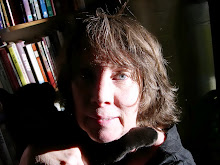Happy Holy Days to All
The tinsel set into my fine hair always scratched, and the angel robe made of muslin sheets wasn't nearly as elegant as the sky blue robes worn by Mary. Mary was always some dark haired girl I hated. I had trouble keeping my wings on. Balancing on boxes in the back of the stage, singing quavering glorias--no, it really wasn't my thing at all.
My mother was unsympathetic. I could have been a shepherd, she said, telling me the story of the year she had to wear an ugly blanket and pretend to herd sheep, after her angelic years before. She'd had her hair chopped short that year, and the teachers told her she wasn't worthy of wings and glitter.
But I wanted to be Mary. Mary had lines in the play, and was the one under the lights, and who said she had to have dark hair?
This minor and ongoing disappointment of my traveling youth came up this year because P. and Gabe and I went to a Christmas Eve vigil at the tiny Catholic church in the neighboring town. Paul was raised in that church; I was thrown out of my own protestant version--a story I may one day write. But lately we've had encounters with a deacon of the church who is a Catholic radical. We get along very well with that sort of person--to combine spirit and social action is a sweet and reasonable thing for us. So, invited to the vigil, we went.
We were late. I'm an early person, myself--always about 15 minutes ahead of time to meetings and events. I like to check out the surroundings. I like to feel safe. Paul is always about 2 hours behind any promised time, but can, with struggle, make it within a half hour. And when it is the Holy Church--well, he tried. He went there before coming to collect Gabriel and me, to warn the ushers we'd be barging in like sheep or angels.
Well, probably he didn't say sheep or angels.
So we slid in, and took our places in the back pew, as the tiny children, most of them from the Spanish speaking community, gathered for the tableau: little angels and Joseph, a scattering of shepherds, and tiny sweet Mary, and all the rest.
The priest had come from one of the big cities down south, and tried to deliver a good sermon. The congregation tried to sing. We prayed for the leaders of the world, that their hearts might soften, we prayed for peace, we prayed for a lot of things, and tears ran down my face, as they often do when things like the hope of peace and the pains of this world seem to collide.
Listening to the priest's version of the story of the birth of Jesus I found myself thinking "yes, the child was special--they all are". The people around me were dressed very simply--this was no church in which people had gathered to show off finery.
And this year's tiny angels ran around the pews. Gabriel, for his part, was bored with it all. "Fake" he kept saying. Was it the statues, or theology? I haven't quite figured it out.
But there is a sort of blessing to the cycles of the year nonetheless.
After Paul took communion (I, being of "a different persuasion" declined, though I often take communion with the nuns at a local monastery) and we wandered into the newly falling rain.
"It could be snow, elsewhere" said the smiling woman who'd been buying mysteries a few days before. Well, we could pretend.
I returned to start the potica baking. It takes up to six hours, this rich yeast bread, ceremonially shaped, filled with a nutmeat paste. I bake it, as I promised Paul when we first joined our lives, for Christmas, Easter, and his birthday. I have his mother's recipe, straight from her new-from Slovenia mother, handed down for generations. Each woman who has taken on the recipe has made small and large changes. My version this year was a slightly defiant hybrid. Why not fold it the traditions of my Finnish mother and grandmother and greatgrandmother? So the ground almonds and the sweet yeast dough were spiked with a touch of cardamon this year.
Paul, harking back to the Dickens Christmas Carol he reads to the family over the 12 days, called it the best potica ever--baked in a toaster oven, shaped on a cardboard box.
Fruit of the fields, shaped by human hands--let it be for us a connection with the universe.
We shared it with friends and wanderers and with our children, warm in the bookstore, wind and rain blowing.
It is shaped in a circle, an ancient token of the wheel of the year, the wheel of time, and the lovely sun, moon, and earth.
There are mysteries still, beneath the simple things. And then we read aloud from our translation of Hafiz--why not fold in some other lights into our life? The poem I turned to invited me to sing ribald songs to my animals and plants, to hug my children, and to turn to my love with a renewal of the first love I felt.
And why not? Even if I made a bad angel, I guess I can rejoice a bit.


